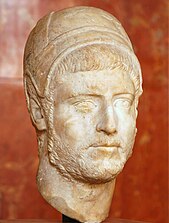| Part of a series on the |
| Priesthoods of ancient Rome |
|---|
 |
| Major colleges |
| Other colleges or sodalities |
| Priests |
| Priestesses |
| Related topics |
In ancient Rome, the quindecimviri sacris faciundis were the fifteen (quindecim) members of a college (collegium) with priestly duties. They guarded the Sibylline Books,[1][2][3] scriptures which they consulted and interpreted at the request of the Senate.[4] This collegium also oversaw the worship of any foreign gods which were introduced to Rome. They were also responsible for responding to divine advice and omens.[5]
Originally these duties had been performed by duumviri (or duoviri), two men of patrician status.[6][7] Their number was increased to ten by the Licinian-Sextian Law in 367 BC, which also required for half of the priests to be plebeian. During the Middle Republic, members of the college were admitted through co-option. Sulla increased the number of priests to fifteen.[8] The Lex Domitia removed their ability to select their own members in 104 BCE. Afterwards candidates from wealthy Roman gentes would be elected.[9]
At some point in the third century BC, several priesthoods, probably including the quindecimviri, began to be elected through the voting tribes.[10]
- ^ Linderski, J. (2016-03-07). "books, sacred and cultic". Oxford Research Encyclopedia of Classics. doi:10.1093/acrefore/9780199381135.013.7007. ISBN 978-0-19-938113-5. Retrieved 2023-01-09.
- ^ Walton, Francis Redding; Scheid, John (2015-12-22). "Cybele". Oxford Research Encyclopedia of Classics. doi:10.1093/acrefore/9780199381135.013.1970. ISBN 978-0-19-938113-5. Retrieved 2023-01-09.
- ^ Pease, Arthur Stanley; Potter, David (2015-07-06). "Sibyl". Oxford Research Encyclopedia of Classics. doi:10.1093/acrefore/9780199381135.013.5903. ISBN 978-0-19-938113-5. Retrieved 2023-01-09.
- ^ Drogula, Fred K. (2019). Cato the Younger: Life and Death at the End of the Roman Republic. Oxford University Press. p. 26. ISBN 978-0-19-086902-1.
- ^ Potter, David Stone; Mattingly, D. J. (1999). Life, Death, and Entertainment in the Roman Empire. University of Michigan Press. p. 144. ISBN 978-0-472-08568-2.
- ^ Treves, Piero; Bailey, Cyril; Lintott, Andrew (2016-03-07). "collegium". Oxford Research Encyclopedia of Classics. doi:10.1093/acrefore/9780199381135.013.1724. Retrieved 2023-01-09.
- ^ Beard, Mary; North, John; Price, Simon (1998-06-28). Religions of Rome: Volume 2, A Sourcebook. Cambridge University Press. p. 130. ISBN 978-0-521-45646-3.
- ^ Dillon, Matthew; Garland, Lynda (2013-10-28). Ancient Rome: A Sourcebook. Routledge. p. 140. ISBN 978-1-136-76136-2.
- ^ North, John (2016-03-07). "quindecimviri sacris faciundis". Oxford Research Encyclopedia of Classics. doi:10.1093/acrefore/9780199381135.013.5482. ISBN 978-0-19-938113-5. Retrieved 2023-01-09.
- ^ Andrew Lintott, The Constitution of the Roman Republic (Oxford University Press, 1999), pp. 183–184 online.